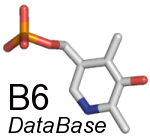|
|
| type |
Journal Article |
| authors |
Li, N.; Mattoo, A. K. |
| title |
Deletion of the carboxyl-terminal region of 1-aminocyclopropane-1-carboxylic acid synthase, a key protein in the biosynthesis of ethylene, results in catalytically hyperactive, monomeric enzyme |
| journal |
J Biol Chem |
| Activity |
4.4.1.14 |
| Family |
4.4.1.14 |
| ui |
Dctracs |
| year |
(1994) |
| volume |
269 |
| number |
9 |
| pages |
6908-17 |
| | |
|---|
| keywords |
Amino Acid Sequence |
| abstract |
1-Aminocyclopropane-1-carboxylic acid (ACC) synthase is a key enzyme regulating biosynthesis of the plant hormone ethylene. The expression of an enzymatically active, wound-inducible tomato (Lycopersicon esculentum L. cv Pik-Red) ACC synthase (485 amino acids long) in a heterologous Escherichia coli system allowed us to study the importance of hypervariable COOH terminus in enzymatic activity and protein conformation. We constructed several deletion mutants of the gene, expressed these in E. coli, purified the protein products to apparent homogeneity, and analyzed both conformation and enzyme kinetic parameters of the wild-type and truncated ACC syntheses. Deletion of the COOH terminus through Arg429 results in complete inactivation of the enzyme. Deletion of 46-52 amino acids from the COOH terminus results in an enzyme that has nine times higher affinity for the substrate S-adenosylmethionine than the wild-type enzyme. The highly efficient, truncated ACC synthase was found to be a monomer of 52 +/- 1.8 kDa as determined by gel filtration, whereas the wild-type ACC synthase, analyzed under similar conditions, is a dimer. These results demonstrate that the non-conserved COOH terminus of ACC synthase affects its enzymatic function as well as dimerization. |
| last changed |
2008/04/25 17:36 |
|











